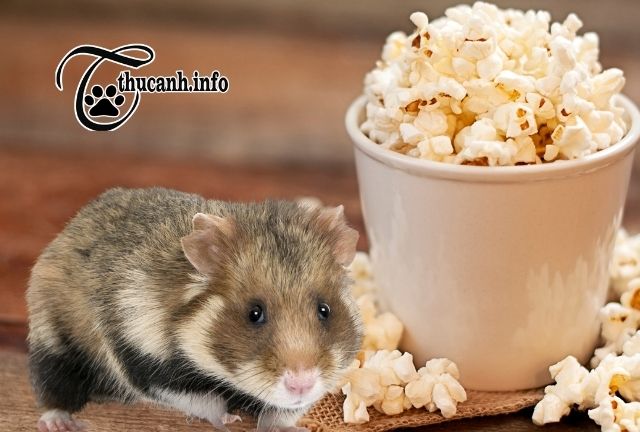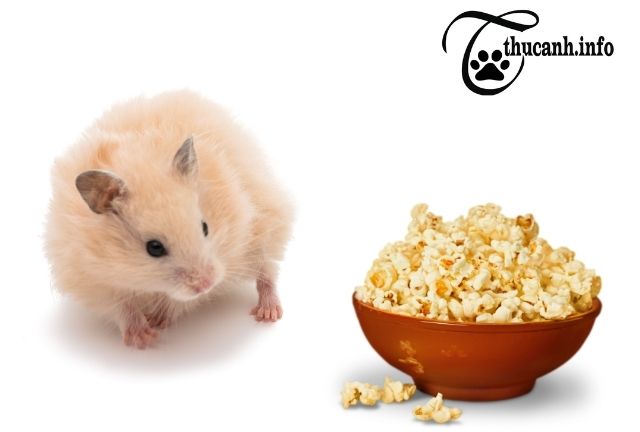Can Hamsters Eat Popcorn? Hamsters are popular pets known for their small size and adorable demeanor, which makes them a great addition to any household. As with any other pet, hamsters require proper nutrition to stay healthy. While fruits and vegetables are the most common foods that hamster owners feed their pets, some may wonder whether popcorn can also be included in their diet. In this article, we will explore whether hamsters can safely consume popcorn and the health risks and benefits associated with this type of food.

Is it good or bad for hamsters to eat corn?
1. Can Hamsters Eat Popcorn?
Yes, hamsters can eat popcorn, but it should be given in moderation and prepared in a specific way to ensure it is safe for them. Unseasoned, air-popped popcorn without added salt or butter is the best option for hamsters. Avoid flavored or microwave popcorn, as they often contain additives that can be harmful to hamsters. It’s important to remove any unpopped kernels to prevent choking hazards. Remember, popcorn should only be an occasional treat in a well-balanced hamster diet.
2. Nutritional Benefits of Popcorn for Hamsters
Popcorn is a source of carbohydrates for energy and provides dietary fiber for healthy digestion. It also contains essential minerals like calcium, iron, magnesium, phosphorus, potassium, and zinc, which are beneficial for a hamster’s overall health.
| Nutrient | Percentage | Benefit |
|
Carbohydrates |
77g |
Provides energy |
|
Protein |
13g |
Supports muscle growth and repair |
| Dietary Fiber | 15g |
Aids digestion and promotes gut health |
| Calcium | 11mg |
Contributes to bone and teeth health |
| Iron | 2.7mg |
Helps in oxygen transportation |
| Magnesium | 144mg |
Essential for enzyme function |
| Phosphorus | 358mg |
Important for bone health |
| Potassium | 329mg |
Regulates fluid balance and nerve function |
| Zinc | 2.2mg |
Supports immune function |
3. Potential Risks of Feeding Popcorn to Hamsters
While popcorn can be a tasty treat for hamsters, there are some potential risks associated with feeding it to them:
- Choking Hazard: Popcorn kernels are small and hard, posing a choking hazard to hamsters. It’s essential to avoid giving them whole kernels to prevent choking incidents.
- Unpopped Kernels: Unpopped kernels can be even more dangerous as they are harder and can cause dental issues or mouth injuries if chewed.
- Salt and Additives: Popcorn seasoned with salt, butter, or other additives can be harmful to hamsters. These ingredients can lead to dehydration, digestive upset, or even obesity.
- Fungal Contamination: Popcorn can be susceptible to fungal contamination, which may lead to health issues if ingested by hamsters.
- Digestive Upset: Due to its fibrous nature, popcorn might cause digestive issues in some hamsters, leading to bloating or diarrhea.
To ensure the safety of your hamster, offer plain, air-popped popcorn without any additives or seasoning, and always monitor their intake to avoid overfeeding. Additionally, consider providing other safer and more suitable treats for hamsters to maintain a balanced diet.

The amount of popcorn a hamster should eat
4. How Much Popcorn Can Hamsters Eat?
While popcorn can be a fun occasional treat for hamsters, it should be fed in moderation due to its potential risks. As a guideline, a small piece or a few pieces of plain, air-popped popcorn once a week is sufficient for a hamster. Remember to avoid giving them the unpopped kernels, as they can be hard and pose a choking hazard. Always monitor your hamster’s intake and ensure their overall diet consists mainly of a balanced hamster pellet mix and fresh vegetables for optimal health.
5. Preparing Popcorn for Hamsters
To prepare popcorn for hamsters, follow these steps:
- Air-Popped: It’s essential to provide plain, air-popped popcorn without any added salt, butter, or seasoning. Avoid microwavable or pre-packaged popcorn, as they often contain additives harmful to hamsters.
- Small Pieces: Break the popcorn into small, manageable pieces that are easy for your hamster to eat. This prevents choking hazards and ensures they can handle the snack comfortably.
- No Unpopped Kernels: Remove any unpopped kernels from the popcorn bowl, as they can be hard and dangerous for hamsters to chew on.
- Occasional Treat: Popcorn should only be given as an occasional treat due to its potential risks and high carbohydrate content. A small piece once a week is sufficient.
- Freshness: Serve fresh popcorn and avoid storing it for too long, as it can become stale and lose its appeal to your hamster.
Always monitor your hamster’s reaction to popcorn and their overall diet to ensure it remains balanced and healthy. Consult with a veterinarian if you have any concerns about their diet or health.
6. Alternatives to Popcorn for hamsters
There are several safe and healthy alternatives to popcorn that you can offer to your hamster:
|
Food |
Nutritional Benefits |
|
Seeds |
Provide essential fats and proteins |
|
Fruits |
Offer vitamins and natural sweetness |
|
Vegetables |
Rich in vitamins and fiber |
|
Whole Grains |
Good source of carbohydrates |
|
Nuts |
Provide healthy fats and protein |
|
Dried Mealworms |
High in protein, a tasty treat for hamsters |
7. Foods to Avoid in a Hamster’s Diet
Here’s a list of foods to avoid in a hamster’s diet:
- Chocolate: Contains theobromine, which is toxic to hamsters.
- Sugary Foods: Can lead to obesity and dental problems.
- Citrus Fruits: High acidity can upset a hamster’s stomach.
- Onions and Garlic: Toxic to hamsters and can cause digestive issues.
- Almonds and Other Nuts with High Fat Content: Too much fat can lead to health problems.
- Raw Beans and Peas: Contain harmful compounds that are toxic to hamsters.
- Rhubarb: Contains oxalic acid, which is poisonous to hamsters.
- Caffeinated or Carbonated Beverages: Can be harmful to hamsters.
- Dairy Products: Hamsters are lactose intolerant and cannot digest dairy well.
- Processed or Fried Foods: Too much salt and additives can be harmful.
8. Popcorn allergies and intolerances in hamsters
Hamsters can be sensitive to certain foods, and popcorn is no exception. Some hamsters may have allergies or intolerances to popcorn. Common signs of an allergic reaction or intolerance in hamsters may include:
- Diarrhea: Loose or watery stools may indicate a negative reaction to popcorn.
- Upset Stomach: Vomiting or bloating can be a sign of digestive issues caused by popcorn.
- Itchy Skin: Scratching, biting, or excessive grooming could indicate an allergic reaction.
- Respiratory Problems: Wheezing, sneezing, or difficulty breathing may be a response to popcorn allergens.
If you suspect your hamster is having an adverse reaction to popcorn, it’s best to remove it from their diet immediately and consult with a veterinarian. It’s essential to monitor your hamster’s health and provide a balanced and safe diet to ensure their well-being.

Questions about popcorn and hamster
9. Frequently Asked Questions (FAQs)
9.1. Can Hamsters Eat Popcorn Every Day?
No, hamsters should not eat popcorn every day. While popcorn can be a fun occasional treat for hamsters, it should not be a regular part of their diet. Popcorn is high in carbohydrates and low in nutritional value for hamsters, so feeding it to them every day can lead to obesity and other health issues.
9.2. Can Baby Hamsters Eat Popcorn?
No, baby hamsters should not eat popcorn. Baby hamsters have delicate digestive systems and are still developing, so it’s essential to provide them with a diet that is suitable for their age and nutritional needs.
Popcorn is not a suitable food for baby hamsters because it is difficult for them to chew and digest. The hard kernels and fibrous outer layer of popcorn can pose a choking hazard for young hamsters and may cause digestive issues.
9.3. Can Hamsters Eat Popcorn Kernels?
No, hamsters should not eat popcorn kernels. Popcorn kernels are hard and can be a choking hazard for hamsters. Additionally, the tough outer shell of popcorn kernels can be difficult for hamsters to digest and may cause digestive issues.
If you want to offer your hamster popcorn as a treat, make sure it is fully popped and without any kernels. Remove any unpopped kernels from the popped popcorn before giving it to your hamster. However, popcorn should only be given occasionally and in small quantities as a treat, as it is not a natural part of a hamster’s diet.
9.4. Can Dwarf Hamsters Eat Popcorn?
Dwarf hamsters can eat popcorn, but it should be given in moderation and with caution. Popcorn can be a choking hazard for hamsters, so it’s crucial to ensure that the popcorn is fully popped and without any unpopped kernels before offering it to your dwarf hamster.
While some dwarf hamsters may enjoy popcorn as an occasional treat, it should not be a regular part of their diet. A balanced diet for dwarf hamsters should primarily consist of specially formulated hamster pellets, fresh vegetables, and occasional treats like small amounts of fruits or plain popcorn.
9.5. Can Hamsters Eat Salted Popcorn?
No, hamsters should not eat salted popcorn or any other salted foods. Salted popcorn contains high levels of salt, which is harmful to hamsters. Hamsters have very small bodies and are sensitive to excess sodium, which can lead to health issues like dehydration, kidney problems, and other complications.
9.6. Can Hamsters Eat Sweet Popcorn?
No, hamsters should not eat sweet popcorn or any other sugary foods. Sweet popcorn contains high levels of sugar, which is not suitable for hamsters. Hamsters have specific dietary needs, and their digestive systems are not designed to handle sugary or sweetened foods.
Feeding sweet popcorn to hamsters can lead to health issues such as obesity, tooth problems, and digestive disturbances. It is crucial to provide hamsters with a balanced and nutritionally appropriate diet that consists of specially formulated hamster pellets, fresh vegetables, and limited amounts of suitable treats.
9.7. Can hamsters have popcorn with butter?
No, hamsters should not have popcorn with butter or any other toppings. Butter and other toppings often used on popcorn, such as salt, oil, cheese, or seasonings, are not suitable for hamsters. These toppings can be harmful to their health and may cause digestive issues, obesity, or other health problems.
Hamsters have specific dietary requirements, and their digestive systems are sensitive to certain foods. Their diet should consist of specially formulated hamster pellets, fresh vegetables, and limited amounts of suitable treats. Plain, unsalted, and air-popped popcorn can be given to hamsters as an occasional treat in small quantities.
9.8. Can hamsters eat cheese popcorn?
Hamsters should not eat cheese popcorn or any flavored popcorn that contains additives, seasonings, or toppings. Cheese popcorn is not suitable for hamsters as it typically contains high levels of salt, fat, and artificial flavorings, which can be harmful to their health.
9.9. Can hamsters eat white cheddar popcorn?
Hamsters should not eat white cheddar popcorn or any flavored popcorn that contains additives, seasonings, or toppings. White cheddar popcorn is not suitable for hamsters as it typically contains high levels of salt, fat, and artificial flavorings, which can be harmful to their health.
In conclusion, while hamsters can eat popcorn in small quantities as an occasional treat, it is essential to ensure that it is plain, unsalted, and free from any additives or seasonings. High-fat, salted, or flavored popcorn should be avoided, as they can be harmful to hamsters’ health. As responsible pet owners, it is crucial to provide a balanced and nutritious diet that meets their specific dietary requirements. If you have any doubts about what foods are safe for your hamster, consult with a veterinarian to ensure you are providing the best care and diet for your furry friend. Remember, a healthy and happy hamster is a well-fed and well-cared-for hamster. We hope the article “Can Hamsters Eat Popcorn” on Thucanh.info provides you with valuable information.


